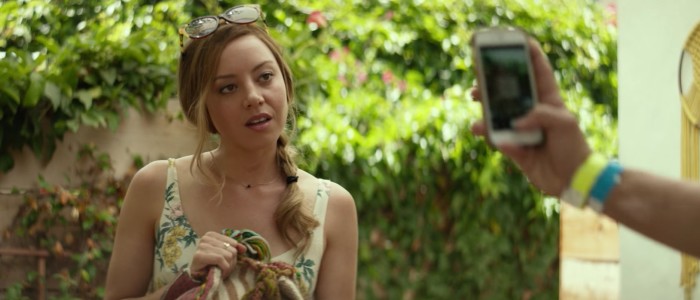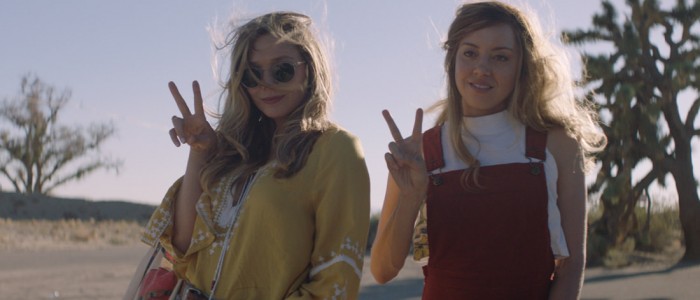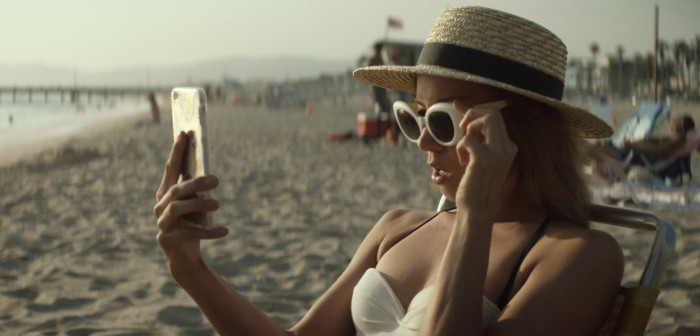'Ingrid Goes West' Director Matt Spicer On Aubrey Plaza's Dark And Harrowing Journey [Interview]
With Ingrid Thorburn (Aubrey Plaza) leading the way in Ingrid Goes West, it's often tough to predict which direction Matt Spicer's dark comedy will go in next. Ingrid goes to great lengths to turn Taylor Sloane (Elizabeth Olsen) into her best friend so the whole world can see her Instagram. Aubrey's character searches for a friend in a sad, laugh-filled descent in the sunny, "good vibes only" part of California.
Ingrid Goes West calls to mind movies like The Cable Guy, Taxi Driver, and The Talented Mr. Ripley. There's a loneliness to the lead characters of those movies that can also be found in Ingrid. Her motive is wanting friendship. Yeah, she's deceptive in the course of her journey, but so are a lot of the characters in Spicer's feature directorial debut, which he co-wrote with David Branson Smith.
Below, check out our Matt Spicer interview, where we chat all about the new movie, which is in theaters today.
Not knowing much about the story, during the second act I did not have any idea where this story was going. Ingrid made me think of Travis Bickle, and I thought she could've gone down a path almost as dark as his.
That is the highest compliment that I think you could give. But yeah, that's great. I mean, it's so funny because I've been living with it for so long. But I remember when Dave and I were writing it, we definitely wanted it to have that feeling of if you were seeing the movie for the first time, you really would have no idea where it could go and that there was this level of like, somebody could maybe die.
After you and Dave finished the script, what qualities were you looking for in an actor to play Ingrid?
I wanted somebody who wasn't going to be afraid to sort of really bring themselves into the role. Like I think Aubrey – just from talking to her, it made me happy from the beginning. She was like, "I don't want to treat this like a comedy. I don't want to approach it as an actor like I'm being in a comedy. I want it to feel like I'm in a dramatic film." You know what I mean? And the script is funny and so the comedy will come through, but the comedy should all come from the character and the situation. It's not from jokes, you know? And I just think that was exactly how I was wanting to approach it and it's refreshing to hear that.
I was a fan of hers also, I think she's hilarious. But I didn't know sort of her background and that she went to NYU and went to film school, so she didn't necessarily start out wanting to be an actress. She started out from a place of just loving film and wanting to know as much about film as she could. She approached it like a filmmaker, and it always really makes your job a lot easier as a director, I think, when your actors are thinking about the whole picture and not just their contribution to it. She was really thinking about how her performance would affect the entire thing and what people would take away from it, not just like, "Oh, am I funny enough in this scene?" Or "Am I this or that?" You know, it was going to serve the greater story and the greater purpose of the film.
It usually seems the best actors always see themselves as a small part of the puzzle.
Right. Yes, exactly. I think it's easy to kind of get wrapped up in just your part. But yeah, it's obviously the whole thing. If the whole thing doesn't work, your part won't matter.
Creating Ingrid, did she come very naturally to you and David? Was she at all inspired by people you had come across?
I think our initial approach to her, we had all these conflicting feelings about social media ourselves and we kind of were just looking for the perfect vessel for us to pour all of our own sort of insecurities and fears and also feelings about social media, whether they be positive or negative in just one character. That was sort of where it came from. But we didn't necessarily write it with Aubrey in mind. It was just sort of, like, who would be the person that Instagram would be the worst thing that could possibly happen to them? That's where she really came out of. Once I heard that Aubrey was into it, it just came totally into focus and I could just see it perfectly clear from that point.
 I know you did some rewriting while shooting because you got to know the characters more. How did they or the film evolve?
I know you did some rewriting while shooting because you got to know the characters more. How did they or the film evolve?
Nothing really changed about the story. It was just sort of our approach to certain themes. For example, the Halloween party scene. We intentionally scheduled some of the later parts of the film towards the end of the shoot, and we shot a lot of the earlier stuff from the film at the beginning of the shoot. We didn't shoot it in sequence, but we did as much as we could and by the time we got to the Halloween party scene, where Lizzie and Aubrey sort of confront each other, it was pretty clear. They knew their characters so well at that point. And they had come to me the night before and they started – originally, they have this fight in front of a whole party. They sort of came to me and said, "You know, I don't think that these girls would be able to be totally honest with each other if they were standing in front of all these people, especially Taylor."
So we started talking about that and that's how we ended up moving it to them moving away from the party. And then once we did that, it was like, "Okay, now we can really let each other have it," and in a way that wasn't necessarily on the page before. We did a rewrite to that effect. And it ended up being one of my favorite scenes in the movie. It really came out of the girls just knowing their characters so well and saying, "You know what? I have an idea. I think there's a better way to approach this," and we just sort of hammered it out together and got it to a place where I was super happy with it.
That's just one example, but it was throughout the entire shoot. We'd rehearse a scene and then it'd be like, "All right, this is not working at all. What can we do?" What's wrong with it? How can we fix it? And people started drawing out ideas and you started to get excited about it again. That's always a good sign, I think, when you've been living with something for a year and then you start to get excited about it again. Like, okay, we're on the right track.
Do you recall any ideas O'Shea Jackson brought to Dan Pinto?
Oh my god, so many. I mean, he is a huge Batman fan. Specifically, the scene where they're on their date scene and he's talking about why he loves Batman, a lot of that was O'Shea. There was stuff on the page too, but he just was able to really passionately talk about it. You know, it would be crazy to make him stay on script when he is able to sort of say all these things. But he had some great lines that didn't even make it in the film, but that would crack us up. But we couldn't use for whatever reason, but it's the two-part line where it was totally an improv thing that he did that I just thought was so funny. He's just such a natural. I've never seen somebody who's so able to be so effortlessly charming and likable and just himself in front of the camera. It's really something to watch.
I love the date where we see Ingrid be real with Dan. It's such a pivotal moment. Anything memorable about writing or shooting that scene?
Believe it or not, that was O'Shea's first day with that scene. So that was their first scene together. And not by choice necessarily, just how the schedule worked out. It was really funny because they didn't know each other that well, and so it was kind of them getting to know each other through their characters and through working together. I was blown away by Aubrey's performance because she was able to get to this really vulnerable place, but it wasn't scripted that they were going to kiss in the script. And by the time we started shooting it, it was just like this just feels like a missed opportunity, you know what I mean? It felt like the spark between them that you just, as a director, you just feel, "Oh my god, this is lighting in a bottle right now." It just kept evolving and evolving to the point where they were like furiously making out by the end of it.
That was just sort of, it was this great moment because that was when we realized, "Okay, we might have something here with these two."You hope for something like that, but you can't really plan for it.
These characters feel very familiar in LA. From the beginning, was Los Angeles just the only place you and David saw the story taking place?
Yeah. I think we ... Part of it was a practical thing because I've been trying to direct a feature for a few years before I had another script that I was trying to get off the ground. It just wasn't coming together for whatever reason, and so when Dave and I came up with the idea for Ingrid, it was sort of the idea was let's just write something that we can go make. If we can't get the $2 million or whatever to go make it, then we're just going to make it for $200,000 and we'll Kickstarter it and we'll cast our friends and we'll just go do it.
From the beginning, as we had that kind of DIY idea of we're going to just make this film no matter what and we're not going to take no for an answer. And so we wrote a lot of stuff into it, knowing that we could get these locations. And then, of course, Aubrey ended up coming on and Lizzie and it became this bigger thing which is great. But the idea was let's make a movie about our lives and what's going on around us right now. Because I'm not getting any younger and I want to make something and I feel really passionate about this, and let's just do it.
 Were there any little details or the small things that you've experienced living in LA that you wanted in the movie?
Were there any little details or the small things that you've experienced living in LA that you wanted in the movie?
The one thing, and I did it, was saying everything is the best. Like the best. The best. We gave that to Taylor, but I mean that's something that I do that I think I've picked up just from friends or whatever is this use of hyperbole. You know, like everything's the best. Everything's amazing, or whatever. I just think that's a really funny thing that people that live outside of LA might not talk like. I don't know, I just know that I know a lot of people around me talk like that. That was one thing that we had talked about from the beginning where it's like we want Taylor to always say everything's the best.
It's funny how that happens. Before I got to LA, I don't think I ever said, "It's cool" so much, and I don't think I ever said "Dope" before.
Oh yeah. Yeah, exactly. Also, everybody hugs out here, I noticed. I remember when I first moved out here, everyone was like hugging and I'm like, "Okay." And then I started doing it and then I went back to Philly where I'm from and was like hugging all my friends, and they were like, "Dude, what are you doing? Why are you hugging?" I was like, "That's what people do, man."
(Spoiler warning for the rest of the interview.)[Laughs] I want to ask about the ending. I could maybe see someone taking the wrong message from it. Have you heard any interesting interpretations or takeaways from the final minute that have surprised you?
Well, I'll tell you what, some people I would say have echoed that concern about it, but just about everyone I've talked to, when I really press them, "What do you think? What is your takeaway from the ending?" They're always spot on. I've talked to a lot of 15, 16, 17-year olds that have seen the film and they all totally get it. They get that Ingrid's not supposed to be a role model and about all that stuff. And it's usually older people who are the ones who are like really concerned they are going to take the wrong message from it.
But it's funny. Usually, kids are the ones that are like, "Oh, I totally get it. And I like that the ending didn't treat me like an idiot and tell me," you know, it wasn't like an after-school special that's like "Social media's bad." My favorite films are ... I love Taxi Driver and that ending, he shoots a bunch of pimps and then is rewarded for and called a hero. It's like, I don't think you're supposed to leave taxis ever being like, "Yeah Travis Bickle. I want to be that guy." You know what I mean? I think obviously it's a film, it's not for everybody. It's rated R. You know, it requires a certain level of engagement, I think. It's not something you could just turn your brain off and enjoy, but those are the kind of movies that I like.
 In a way, it feels truthful, too, in that not everyone changes. Ingrid could change, but...
In a way, it feels truthful, too, in that not everyone changes. Ingrid could change, but...
Yeah. We screened it for people, and some people were like, "I just wish that she could just turn off her phone and throw it into the ocean or something." That just doesn't feel like Ingrid. I just can't really envision that. No other ending sold right to me and we just had to follow our instincts. But we've definitely fine tuned the ending, I would say, to get to a point where I felt I was happy with it. I think you add a few frames to that last shot, or you take a few frames away and it doesn't have the same impact.
I also think that Dan Pinto and O'Shea's performance does a lot in terms of what I think is ultimate map to the movie, which isn't necessarily that social media's good or bad, but that authenticity is being valued over whatever fakeness you might experience online. I think that's what Dan Pinto represents and why it's important that he's there in the end, so she really feels she's torn between these two choices. Is she going to go down this path or a different path? Is she going to change or not?
You mentioned the idea of fine tuning the ending. What scenes took required more tweaking in post-production?
We did some fine tuning and tweaking to the beginning. We kept getting these notes about the end, and they were like, "We just don't care about Ingrid and all these things." I was just really frustrated because I was like, I know we have the right ending. Originally, Ingrid, when she got out of the mental hospital in the beginning of the movie, she was going to live with her sister. The performance of the sister was great and everything but I think by taking her out and having it just be Ingrid by herself, you suddenly just empathize with her so much more and understand her loneliness and what's driving her. We really needed that engine to send her on this journey.
And then once we changed that, people started liking the ending. There's an old screenwriting adage that's like, "If there's a problem with your third act, there's a problem with your first act," kind of a thing, and that was a hard lesson we had to learn in post. You know, people weren't taking issue with the ending, but the problem was at the beginning of the film, not the end of the film.
***
Ingrid Goes West is now in theaters and available to rent on iTunes.
